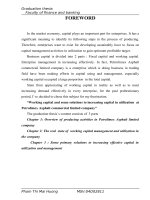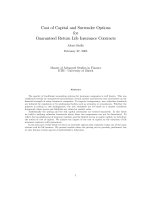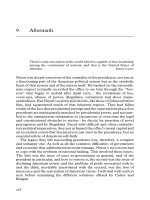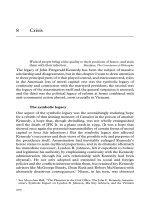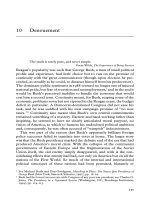Moral capital and politics
Bạn đang xem bản rút gọn của tài liệu. Xem và tải ngay bản đầy đủ của tài liệu tại đây (97.84 KB, 17 trang )
1 Moral capital and politics
Friendships that are acquired by a price and not by greatness and
nobility of spirit are bought but not owned, and at the proper moment
they cannot be spent.
Machiavelli, The Prince
Politics is about power, and power has attractions and uses independent
of its necessity for achieving legitimate social goals. It is not surprising,
then, that one often encounters in the political realm acts of selWsh
ambition, venality, mendacity and betrayal. What is more, even the
best-intentioned players are often forced from the straight and true path
by the cruel exigencies of politics, so that ordinary standards of decent
conduct are oft more honored in the breach than the observance. Yet the
Machiavellian game must be seen to be about something larger than gain,
ambition and survival. Political agents and institutions must be seen to
serve and to stand for something apart from themselves, to achieve some-
thing beyond merely private ends. They must, in other words, establish a
moral grounding. This they do by avowing their service to some set of
fundamental values, principles and goals that Wnd a resonant response in
signiWcant numbers of people. When such people judge the agent or
institution to be both faithful and eVective in serving those values and
goals, they are likely to bestow some quantum of respect and approval
that is of great political beneWt to the receiver. This quantum is the agent’s
moral capital.
Since moral capital thus depends on people’s speciWcally moral apprai-
sals and judgments about political agents and institutions, it must be
distinguished from mere popularity. Popularity may, indeed, be based in
part on moral appraisals but is very often based on quite other sources of
attraction. It is possible to be popular while lacking moral capital, or to
possess moral capital while not being particularly popular. Moreover
popularity, it is usually assumed, may be bought, while moral capital may
not. Like popularity, however, moral capital has genuine political eVects.
It is a resource that can be employed for legitimating some persons,
positions and oYces and for delegitimating others, for mobilizing support
10
and for disarming opposition, for creating and exploiting political oppor-
tunities that otherwise would not exist.
It is not, of course, the only resource that can be so used. In the
constantly contested arena of politics, political leverage and political
ascendancy can be gained by a variety of means – an eYcient electoral
machine, a surety of numbers in the party or legislature, the support of
key players, occupation of a political oYce and consequent access to
institutionalized levers of power, the possession of timely intelligence, a
superior organization capable of coherent action, powers of patronage, an
incompetent or divided opposition, a record of success, a booming econ-
omy. Such factors make up the stock of what we usually call an agent’s
political capital. They are the things to which we ordinarily look when we
seek to understand political processes and outcomes. Moral capital dis-
places none of them but is usually entangled with each of them, for it
generally undergirds all the systems, processes and negotiations of politi-
cal life. Often, its crucial supportive role is not clearly seen until it is lost
and individuals or institutions face consequent crises of legitimacy and
political survival.
This book, then, uses the concept of moral capital to investigate one
aspect of the real force and movement of moral judgment in political life.
Its theoretical premise is (to reiterate) that politics seeks a necessary
grounding in values and ends, and that people’s moral judgments of
political agents and institutions with respect to such values and ends have
important political eVects. It thus rejects overly cynical views, both popu-
lar and academic, that typically suppose politics to be an inherently
amoral realm. In such views, moral judgments in politics are thought to
be at best naıve and irrelevant, at worst hypocritical and pernicious. Or if
moral judgments are relevant at all, they are understood to be formed
beyond the realm of politics itself and applied to it – forced on it, as it were
– from the outside. The action of politics is conceived to be, in this
respect, akin to the action of markets, whose sole internal principle is the
amoral law of supply and demand. If eVective demand exists for slaves,
drugs or child pornography, suppliers will invariably arise to meet it.
When people judge such forms of traYcking immoral or evil, they adopt
an ethical vantage point outside of the market itself; to prevent the trade
they must impose external controls on market forces. But politics, I
argue, is not like the market in this respect. Moral judgment is neither
exterior to nor irrelevant to politics, but intrinsic to it and in principle
inescapable.
Even so, it can scarcely be denied that what might be termed ‘‘realist’’
or Machiavellian views of politics have considerable force, for they seem
so often to provide convincing descriptions of the way politics actually
11Moral capital and politics
works. For it is true that the political environment, even at its mildest, is
tough and unforgiving of weakness or excessive scrupulousness. Ac-
knowledging this, I must begin my essay by describing more fully how the
Weld of politics can be understood in such a way as to allow the concept of
moral capital genuine purchase.
Politics and legitimacy
Politics is the pursuit of ends. It is about what is to be done, how it is to be
done, by whom it is to be done, and with what means it is to be done. It is,
in other words, about policy – the making of socially directive decisions
and the allocation of the resources and instruments necessary to carry
them out. The ultimate aim of political competition – inter-personal,
inter-party or inter-national – is therefore the control of policy. Political
power is the power to determine policy and thus to dispose of social and
material resources (including human beings) in certain ways and for
certain ends rather than in others. It is also the power to distribute
political resources – honors, oYces, authority – in particular ways rather
than in others. The Wrst end of politically engaged people is therefore to
gain command of (or access to) political power in order to control (or
inXuence) the decisions that are made. This involves, on one level, a
struggle for personal position among allies and rivals sharing essential
aims, and, on another, a contest for political advantage among people
with opposed objectives. These political objectives may be either narrow-
ly speciWc or broadly general. At their broadest, they may aim at the
preservation of existing social, political and distributive arrangements, or
at their reform and restructuring, or even at their complete dismantle-
ment and replacement (to cover the traditional spectrum from conserva-
tism to revolutionism).
While politics aims at ends, the political process is endless, for life is
endless and the possibility of change and challenge always present.
Change may be exceedingly slow, permitting islands of historical stability,
or it may be very rapid, throwing even long-prevailing social and political
relations into Xux. Though political action generally strives for stable
ends, it necessarily occupies uncertain ground between the existently real
and the conceivably possible. Its aim may be preservation of the already
existent or, alternatively, its alteration. Thus political ends may embody
present interests or may envisage the annihilation of such interests and
the creation of altogether new ones (and there is nothing to stop a
nihilistic politics from pursuing the extermination of all human interests
whatsoever).
Political ends and interests are seldom uncontested, and champions of
12 Moral capital
opposing ends and interests must be either accommodated, neutralized
or defeated. Though compromise is possible – and indeed sometimes
lauded as a central political virtue – the game is generally played to be
won, particular outcomes being determined by the Xuctuating balance of
political power and the relative exercise of political skill. Compromise –
the settling for less than all one wanted – marks an acceptance that
opposing forces are too strong to be utterly defeated and too weak to be
utterly victorious. Politics is contestation, and contests are about winning
and losing, even if wins and losses may often be only partial. This
emphasis on competitive action toward ends makes eVectiveness a key
political value. As the good hammer is the one that eYciently drives in
nails, the good politician is the one that achieves some reasonable propor-
tion of the ends that he or she intends, promises or deems necessary. But
if winning is all, or almost all, in politics then those who are excessively
squeamish about means surely do not belong in the game. Losers may cry
‘‘foul’’ when rough means are employed, but once the Wnal whistle has
sounded the result will generally stand, leaving outright losers nowhere.
In vicious forms of politics, they may be physically annihilated and thus
not even live to Wght another day. Even in liberal democracies, where
consensually accepted, institutionalized limits on political practice
usually prevent such vicious outcomes, the principles of end-driven poli-
tics remain constant within these constraints.
The basically vulgar emphasis on winning and losing inevitably has a
somewhat vulgarizing eVect on anything touched by politics. If eVective-
ness is key, then it follows that everything will tend to be assessed in terms
of its value as political capital (capital being, by deWnition, a resource for
the achievement of further ends). Thus moral standing, because it can be
as useful a resource as any other, invariably assumes the form of moral
capital in politics. In any human enterprise where sound character and
dedication are deemed necessary for the eVective achievement of
common goals, it is natural that moral standing will tend to take the form
of moral capital. Problems arise, however, if moral standing starts to be
treated as primarily a means to further ends. In ordinary life we presume
that moral character is a value-in-itself, something that governs both the
ends we choose and the means we think it proper to adopt in pursuit of
them. Moral character equates with self-respect, and moral standing with
public respect, either of which are put at risk when treated mainly as a
currency for acquiring other things. We devalue character by commodify-
ing it, and generally deem it a cause for shame and regret to attain some
desired end at the expense of our good name. ‘‘What proWteth it a man if
he gain the whole world and lose his own soul?’’
Yet the political version of Jesus’ question is surely ‘‘What proWteth it a
13Moral capital and politics
politician if he keep his purity and lose his advantage?’’ Everything in
politics – including moral reputation – is liable to be assessed for its
potential as a means for securing political advantage. Political practice,
that is, tends to invert the usual order, causing moral characteristics to be
judged for their utility rather than for their intrinsic signiWcance. Extreme
forms of politics, in which the political realm attempts to swallow up
social and private spheres, go even further and deny any intrinsic signiW-
cance to moral character independently of political action and commit-
ment.
The ‘‘all’s fair’’ tendency of competitive political life often evokes
cynicism that creates diYculties for any politician seeking moral capital.
The politician who attempts to establish a moral reputation for the sake of
its capital value faces a diYculty akin to that of the salesman. Salesmen
seek our trust in order to sell us something, but their need to sell us
something undermines trust; politicians seek our respect in order to
further their political ends, but their need to further their political ends
provokes suspicion and forestalls respect. The honor of politicians having
so often proved as hollow as their promises, their reputation as a class has
frequently tended to fall, like the salesman’s, to the level of the scoundrel
or the hypocrite. ‘‘Get thee glass eyes,’’ cries Lear, ‘‘and like a scurvy
politician, seem to see the things thou dost not.’’ The suspicion arises that
the entire realm of political action is one where honeyed words and
high-sounding phrases cloak raw self-interest, its real driving force.
Raw self-interest may be conceived in terms of power understood as an
end-in-itself, as though all politicians were, covertly, megalomaniacal Dr.
Dooms bent ludicrously on world domination – and indeed, given the
centrality of power to politics this is a possible pathology into which it may
fall.
1
Alternatively, the notorious tendency of power to corrupt may lead
to the presumption that all who seek power are interested only in feather-
ing their own nests – and certainly cases of institutionalized corruption,
occasionally on a spectacular scale, are easy enough to Wnd. More gen-
erally, a dominant strand of Western political thought (often labelled
‘‘realism’’ or, latterly, ‘‘rational choice theory’’) is characterized by what
might be termed methodological cynicism, for it purports to explain all
political phenomena by reducing them to the amoral, quasi-mechanical
clash and adjustment of rationally pursued, but essentially selWsh inter-
ests – and who would deny that interests, both individual and collective,
are often selWshly asserted and defended in politics?
Were any of these forms of cynicism universally and sincerely adopted,
… See Hannah Arendt, The Origins of Totalitarianism (London, Andre´ Deutsch, 1986), pp.
124–133.
14 Moral capital
it would be impossible that moral capital could play any genuine role in
political life. Yet it does, and not because people are too weak-minded to
be constant in either their cynicism or their rational self-interest, or so
liable to be misguided by passion that they foolishly fall into indulging
hope, trust and a desire for justice. It is merely because no human action
and set of human arrangements can ever be placed in principle beyond the
reach of the moral question – beyond, that is, the demand for justiWcation
in general terms. Political action always presumes such justiWcation.
Every claim and counterclaim, charge and countercharge of political
debate attests the inescapability of the moral question in politics. The
language of political argument is always and inevitably highly moralized
(though not necessarily ‘‘moralizing’’). This is not because politicians are
hypocrites, but because the ends of politics must always present them-
selves as morally justiWed according to some set of standards or other.
Even where politics becomes pathological or corrupt, those seeking
power face an urgent political need to justify themselves in general terms.
‘‘The strongest man,’’ wrote Rousseau, ‘‘is never strong enough to be
master all the time, unless he transforms force into right and obedience
into duty.’’
2
Political power can never merely assert itself, but must
establish its moral legitimacy and thus, at the same time, the non-
legitimacy of actual or potential challengers. The same necessity con-
fronts all interests that assert themselves in the political arena: they must
Wrst constitute themselves, at the very least in the eyes of their supporters,
as legitimate interests, arguing not just the contingent existence of their
desires but the rightness and justness of their claims and demands.
This is not a morality that is either prior to or external to an amoral
political realm and imposed upon it from without. It is a morality intrinsic
to the very idea of politics, for politics must always deal with questions of
legitimacy.
3
If politics is the eternal pursuit of ends, it is also the eternal
pursuit of legitimacy. When a regime proclaims its legitimacy, it argues
that existing structures of society and government, their manner of dis-
tributing power, the general ends and interests they encompass, are
morally and practically justiWed. The more generally these claims are
accepted (or at least acquiesced in) by the governed, the more stable is the
regime.
Yet in the end-driven processes of politics, there is a perpetual tension
between the implicit demand for justiWcatory reasons and the permanent
temptation to use any means at hand, including coercive power, to
Jean-Jacques Rousseau, The Social Contract (Harmondsworth, Penguin, 1968), Book I,
chapter 3,p.52.
À This is the essential point made by Bernard Williams in ‘‘Realism and Moralism in
Political Theory,’’ paper delivered to Law Society, Yale University, May 1997.
15Moral capital and politics
